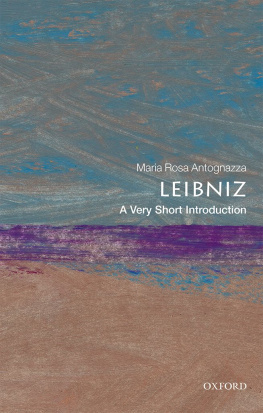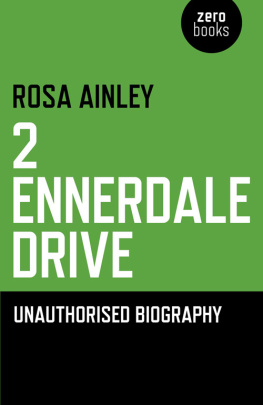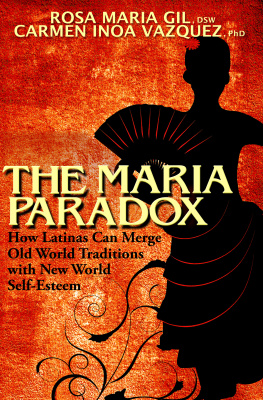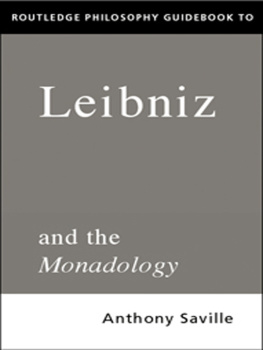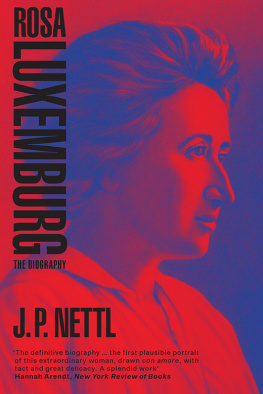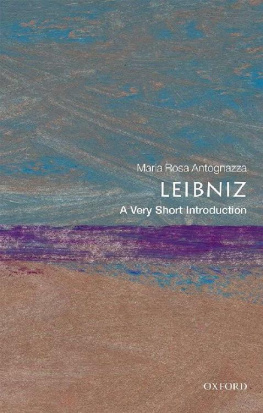Antognazza Maria Rosa - Leibniz: an intellectual biography
Here you can read online Antognazza Maria Rosa - Leibniz: an intellectual biography full text of the book (entire story) in english for free. Download pdf and epub, get meaning, cover and reviews about this ebook. City: Cambridge, year: 2012;2014, publisher: Cambridge University Press, genre: Science. Description of the work, (preface) as well as reviews are available. Best literature library LitArk.com created for fans of good reading and offers a wide selection of genres:
Romance novel
Science fiction
Adventure
Detective
Science
History
Home and family
Prose
Art
Politics
Computer
Non-fiction
Religion
Business
Children
Humor
Choose a favorite category and find really read worthwhile books. Enjoy immersion in the world of imagination, feel the emotions of the characters or learn something new for yourself, make an fascinating discovery.
- Book:Leibniz: an intellectual biography
- Author:
- Publisher:Cambridge University Press
- Genre:
- Year:2012;2014
- City:Cambridge
- Rating:5 / 5
- Favourites:Add to favourites
- Your mark:
- 100
- 1
- 2
- 3
- 4
- 5
Leibniz: an intellectual biography: summary, description and annotation
We offer to read an annotation, description, summary or preface (depends on what the author of the book "Leibniz: an intellectual biography" wrote himself). If you haven't found the necessary information about the book — write in the comments, we will try to find it.
Leibniz: an intellectual biography — read online for free the complete book (whole text) full work
Below is the text of the book, divided by pages. System saving the place of the last page read, allows you to conveniently read the book "Leibniz: an intellectual biography" online for free, without having to search again every time where you left off. Put a bookmark, and you can go to the page where you finished reading at any time.
Font size:
Interval:
Bookmark:

Of all the thinkers of the century of genius that inaugurated modern philosophy, none lived an intellectual life more rich and varied than Gottfried Wilhelm Leibniz (16461716). Trained as a jurist and employed as a counsellor, librarian, and historian, he made famous contributions to logic, mathematics, physics, and metaphysics, yet viewed his own aspirations as ultimately ethical and theological, and married these theoretical concerns with politics, diplomacy, and an equally broad range of practical reforms: juridical, economic, administrative, technological, medical, and ecclesiastical.
Maria Rosa Antognazza's pioneering biography not only surveys the full breadth and depth of these theoretical interests and practical activities; it also weaves them together for the first time into a unified portrait of this unique thinker and the world from which he came.
At the centre of the huge range of Leibniz's apparently miscellaneous endeavours, Antognazza reveals a single master project lending unity to his extraordinarily multifaceted life's work. Throughout the vicissitudes of his long life, Leibniz tenaciously pursued the dream of a systematic reform and advancement of all the sciences, to be undertaken as a collaborative enterprise supported by an enlightened ruler. These theoretical pursuits were, in turn, ultimately grounded in a practical goal: the improvement of the human condition and the celebration thereby of the glory of God in His creation.
As well as tracing the threads of continuity that bound these theoretical and practical activities to this all-embracing plan, this illuminating study also follows these threads back to the intellectual traditions of the Holy Roman Empire in which Leibniz lived and throughout the broader intellectual networks that linked him to patrons in countries as distant as Russia and to correspondents as far afield as China.
Maria Rosa Antognazza is Reader in the Philosophy of Religion at King's College London. A recipient of research fellowships from the British Academy, the Herzog August Bibliothek, and the Leverhulme Trust, she is the author of Leibniz on the Trinity and the Incarnation: Reason and Revelation in the Seventeenth Century and has contributed to The Cambridge History of Eighteenth-Century Philosophy.

To my husband, Howard Hotson, and our children, John, Sophia, and Francesca
[A]ll these things are connected and have to be directed to the same aim, which is the glory of God and the advancement of the public good by means of useful works and beautiful discoveries.
Tranquillity is a step on the path toward stupidityOne should always find something to do, to think, to plan, concerning ourselves for the community and for the individual, yet in such a way that we can rejoice if our wishes are fulfilled and not be saddened if they are not.
Sometimes so many thoughts occur to me in the morning during an hour in which I am still in bed, that it takes me all morning, and sometimes all day and more, to write them down accurately.
Work on this book began during the tenure of a British Academy Postdoctoral Fellowship and was subsequently supported by the Leverhulme Trust with a two-year research fellowship, which included a grant for research in Germany. I am deeply grateful to these two institutions for allowing me, first, to take up the challenge of this project, and, second, to liberate enough time to see it to completion.
The University of Aberdeen and King's College London provided the research-friendly environments necessary for the flourishing of academic work. Over the years I have become indebted to a great many people who in different ways have contributed to the completion of this book. My husband, Howard Hotson, has supported and advised me during all stages of this project. Without him this book could never have been written. In particular, I have enormously benefited from his deep understanding of the intellectual history of the period. With extraordinary scholarly generosity, Massimo Mugnai and Paul Lodge have carefully read and commented on a complete draft of this book. I owe them many insightful suggestions and sincere gratitude for sharing with me their profound knowledge of Leibniz. Heinrich Schepers, Robert M. Adams, Knud Haakonssen, and Udo Thiel read the initial prospectus of the book and encouraged me to embark on this venture. Their support at various stages of my work, together with the sympathy and encouragement of Maria Grazia Zaccone Sina and Mario Sina, have meant a great deal to me. Niccol Guicciardini has provided invaluable advice, especially on mathematics. I am grateful to Sean Greenberg for his feedback on some aspects of my work, and to an anonymous reader who reviewed the manuscript for a number of helpful suggestions. Vincenzo De Risi, Franois Duchesneau, Laurent Jaffro, Arnaud Pelletier, Lidia Ripamonti, Christoph Selzer, and Stephan Waldhoff have advised me on specific points and/or sent me rare literature from Germany. I am grateful to Daniel Garber, Brandon Look, Michael Murray, and Donald Rutherford for sharing with me their work in progess or in press. With great kindness and expertise, Herbert Breger helped me resolve a number of biographical riddles during my visits to the Leibniz-Archiv. My sincere thanks also go to the editors of the Akademie-Ausgabe and to the staff of the Gottfried Wilhelm Leibniz Bibliothek/Niederschsische Landesbibliothek for their cordiality and help over many years.
A more abstract but no less profound debt of gratitude is owed to generations of past and contemporary Leibniz scholars without whose work this present contribution would be utterly unthinkable. Mller and Krnert's Leben und Werk von Gottfried Wilhelm Leibniz has provided an indispensable chronological framework which has guided my own research and assisted inestimably in locating many key primary sources. The classic biography by G. E. Guhrauer has likewise provided a still valuable point of departure, supplemented by the more recent work of E. J. Aiton and Heinrich Schepers, an illuminating entry in the Neue Deutsche Biographie . My enormous debt to a great many excellent individual studies large and small is recorded in the footnotes and bibliography. It has been a delight and a privilege to attempt to stitch these together, and I hope that at least a majority of these authors will feel that I have done their research justice.
Font size:
Interval:
Bookmark:
Similar books «Leibniz: an intellectual biography»
Look at similar books to Leibniz: an intellectual biography. We have selected literature similar in name and meaning in the hope of providing readers with more options to find new, interesting, not yet read works.
Discussion, reviews of the book Leibniz: an intellectual biography and just readers' own opinions. Leave your comments, write what you think about the work, its meaning or the main characters. Specify what exactly you liked and what you didn't like, and why you think so.


